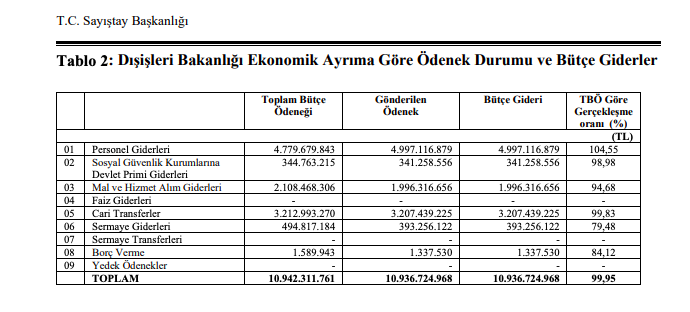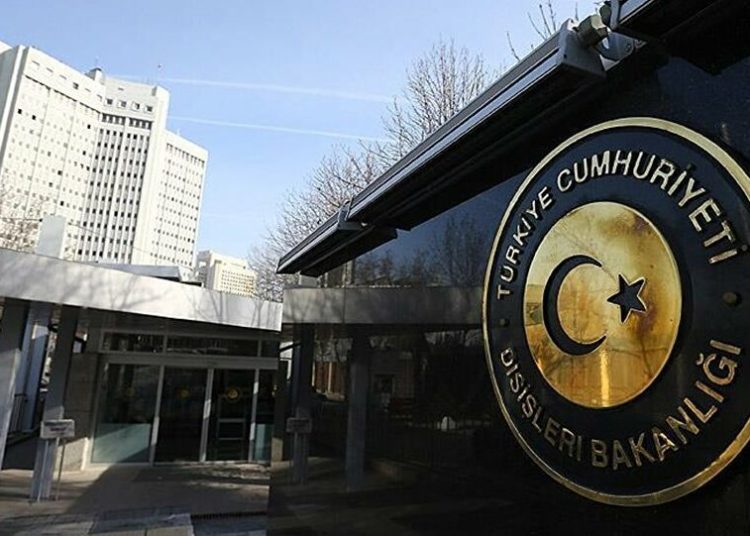Levent Kenez / Stockholm
A September 2023 audit report from the Turkish Court of Accounts reveals the utilization of foreign ministry funds for NGOs and the recruitment of partisans lacking diplomatic credentials but with close ties to the government. The foreign ministry’s allocation from the 2022 budget was TL 7.48 billion. According to the report, the ministry’s spending exceeded the total amount allocated from the central budget. In the same year the ministry received an extra TL 3.5 billion from the Treasury, almost half its annual budget allocation.
The audit report highlights that the ministry’s largest expense item in 2022 was personnel, at TL 4.99 billion. The balance sheet shows a significant increase in personnel expenses due to depreciation of the Turkish lira against foreign currencies.
In a parliamentary committee meeting on Monday, Minister of Foreign Affairs Hakan Fidan shared information indicating that the new 2024 budget anticipates allocating a budget of TL 31.4 billion (approximately $1.09 billion) to the ministry. Approximately 55 percent of the budget is used for foreign mission expenses, while 31 percent is designated for contributions to international organizations and the salaries of teachers and and religious officials abroad. Additionally, a budget proposal of TL 4.6 billion, including TL 4.2 billion for participation in EU programs, has been submitted for the committee’s approval for ministry’s directorate for EU affairs. The budget proposal for the Turkish Accreditation Agency, amounting to TL 266 million for 2024, is also awaiting approval.
During the committee meeting, opposition members of parliament drew attention to the continuous decrease in the allocation of funds from the general budget to the ministry over the years, attributing it to the poor performance of the Turkish economy. Additionally, they pointed out that political appointments for ambassadorships have led to unhappiness within the ministry.
Former ambassador and current lawmaker from main opposition Republican People’s Party’s (CHP) Namık Tan highlighted concerns over the increasing number of political appointments, now totaling 22 ambassadors, who lack a background in diplomacy. Tan drew attention to the fact that approximately 10 out of nearly 30 positions at the General Directorate level in the ministry are now held by individuals without diplomatic experience, marking a departure from the ministry’s traditional practices.
Tan questioned the impact of this trend and its compatibility with the ministry’s longstanding professional norms, which have been in place since the time of the Ottomans. He called for an explanation regarding any claimed tangible, measurable and differentiating contributions resulting from these political appointments.
Tan has expressed reservations about recent diplomatic appointments, citing instances where appointees, notably a former ruling party member assigned to the Jakarta Embassy, have exhibited partisan behavior. Tan emphasized concerns about the appointee’s use of the official Twitter account to applaud party colleagues from his previous electoral district, highlighting a departure from diplomatic neutrality.

In response to the mounting concerns, Tan revealed that a parliamentary inquiry has been launched into these controversial appointments. However, he noted a lack of response from the ministry regarding any potential administrative actions or warnings issued against the ambassador involved in the partisan behavior.
Tan further raised transparency issues surrounding the appointment of an ambassador to Libya, emphasizing the limited public access to the appointee’s background information. The absence of a curriculum vitae on official platforms has fueled suspicions, suggesting a deliberate effort to withhold information. (deleted)
Adding to the controversy, media reports have alleged that a former presidential advisor appointed as ambassador to Algeria has a criminal record, including charges of threat and assault. Tan revealed that despite a parliamentary inquiry seeking clarification on this matter, the ministry’s response has been minimal, offering a brief statement asserting that appointments within the ministry adhere to existing laws. Critics perceive this response as dismissive and lacking sufficient reassurance.
Tan also expressed his view that appointing someone from outside the ministry to the position of head of the ministry’s human resources department is not in the best interest of the ministry’s future.
Nordic Monitor previously reported on one of the significant appointments from the National Intelligence Organization (MİT) to the ministry, highlighting the assignment of Hacı Ali Özel as director general of personnel. Özel, who previously served as a deputy to Foreign Minister Fidan when he was the head of MIT, had responsibility for corporate relations at MİT. In 2018 Özel, who had been nominated as a parliamentary candidate for President Recep Tayyip Erdogan’s Justice and Development Party (AKP), returned to his role at MİT after failing to secure a spot on the ticket. Before this, Özel had also served as a deputy undersecretary in the Prime Ministry. During the time when MİT was under the jurisdiction of the Prime Ministry, numerous high-ranking intelligence officials held positions as undersecretaries or deputy undersecretaries. Following Turkey’s transition to a presidential system of governance in 2017, the Prime Ministry was abolished and MİT came under the supervision of the presidency.
Cevdet Akay, another opposition lawmaker, criticized payments to nonprofit organizations, questioning the nature of these organizations that received around TL 55 million. He expressed curiosity about the identity and purpose of these entities, raising concerns about the allocation of funds to pro-government organizations.
Furthermore, the audit report noted that a significant portion of the expenditures from the ministry’s budget pertains to foreign missions. Taking this into consideration, the auditors found that the exchange rate to be used in transactions was not determined in accordance with the relevant regulations.
Text of the audit report of the Turkish Court of Accounts:












